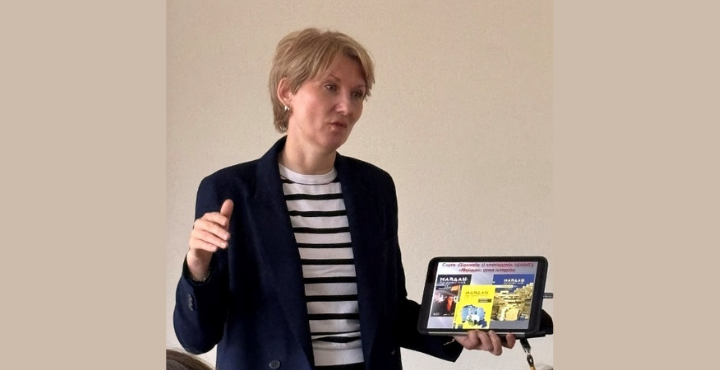First-year master’s students of the International Communications program met with Tetiana Kovtunovych, a historian and curator of oral history projects at the Ukrainian Institute of National Remembrance

The students of the International Communications master’s program had the opportunity to speak with Tetiana Kovtunovych — a historian, curator of oral history projects at the Ukrainian Institute of National Remembrance, coordinator of the project “Maidan: Oral History”, and director of the film “Vohnekhreshcha”. The meeting became an important part of discussing the role of memory, testimony, and communications in shaping narratives about the contemporary history of Ukraine.
Ms. Tetiana spoke about the nature of oral history — what defines this genre, how testimonies are collected, how oral history differs from academic historical scholarship, and what role it plays in preserving human voices and lived experiences. Particular attention was devoted to the question of how to convey history not in a “flat” manner, but in a multidimensional way, taking into account personal experiences and contexts. During the conversation, the invited speaker also presented the oral history projects of the Ukrainian Institute of National Remembrance, including the practices of their creation, systematization, and dissemination, illustrating how these initiatives help build a deeper and more multifaceted perspective on contemporary events.
In an open-discussion format, students recalled their own memories and knowledge of the events of the 2014 Revolution of Dignity, analyzing the communications of that time: the key narratives, the role of spokespersons, and the functioning of information dissemination channels. They discussed how to speak about Maidan today and how to responsibly support a culture of memory.
Ms. Tetiana shared her experience in creating the film “Vohnekhreshcha”: whom she was able to interview, how meetings with participants and witnesses of Maidan were conducted across Ukraine, and what emotional and organizational challenges accompany such conversations. She also spoke about the specificities of communication when working with different individuals: how to build trust, how to help the interlocutor open up, and how to encourage them to tell their own story.
A separate part of the meeting was dedicated to the film’s promotion: which communication channels were used for Ukrainian and international audiences, how messages were adapted, and how the strategy for engaging various groups of viewers was developed.
We sincerely thank Ms. Tetiana Kovtunovych for a warm and meaningful meeting, for her professionalism, openness, and willingness to share her experience. Her insights and professional advice became a valuable addition to the educational process and inspired students to further reflect on the role of communications in preserving historical memory.